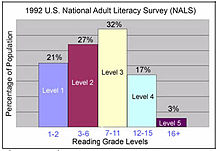User:Bdubay

Introduction
[edit]Hello, I am a professional and a plain-language/readability consultant. For eight years, I was the public-relations officer for the North Slope Borough, an Eskimo-run municipality on Alaska's northern coast. For several years I edited "The Arctic Policy Review," a publication of the Borough. Then for 13 years I was a technical writer for Ashton-Tate and Phoenix Technologies.
I am on the Readability SIG of the International Reading Association and a member of the Society of Technical Communications.
I have been very active in the Plain Language Association International since 1995. In 2001, I have been a consultant in plain language and readability. My clients include the National Aviation Administration, California Public Utilities Commission, Los Angeles County Department of Consumer Affairs, and the Los Angeles Department of Public Social Services.
I have written extensively on readability and my publications include Smart Language: Readers, Readability, and the Grading of Texts, Unlocking Language: The Classic Readability Studies, The Principles of Readability, and the Plain Language at Work Newsletter.
I enjoy contributing to Wikipedia very much. I was a major contributor to the English pages on The history of Los Angeles, [Readability, George R. Klare, and William S. Gray."
My interest in joining the board is to make the language of Wikipedia more accessible to the general reader. There is a vast body of research on readability that could make a major impact on increasing readership. I also am interested in working with the Simple Wikipedia editors and creating a Plain Language Project. I am also interested in the discussions on general editing policies.
A little about plain-language
[edit]Definitions
[edit]"Plain language" and "readability" are synonymous in meaning. They mean "reading ease." "Readability" sometimes is used instead of "legibility" which means the physical ease of recognizing text on a page and refers to typeface, design, format, etc. Among linguists, "readability" just means the score of a readability formula.
Extensive research has shown that reading ease is directly related to comprehension, retention, reading speed, and reading persistence. The easier the text is to read, the more will be understood, the more it will be remembered, the faster it will be read, and the more that will be read.
We have know for a long time that people have different levels of reading skill, and they contribute significantly to reading success. When you pick up a text that is too difficult for you, you recognize that immediately and go do something else (unless you are highly motivated, in which case you will struggle with it.)
Plain Language is not an absolute residing in the text. Easy reading is the result of an interaction between the reader and the text. Those variables in the text that influence comprehension are 1. Content (subject matter, organization, interest, purpose, conciseness, and other features of rhetoric). 2. Style (factors directly affecting reading skill such as vocabulary, sentence complexity, and length), 3. Design (medium, typography, layout, and attractiveness, 4. Usability (chapters, subtititles, headings, reference, etc.). Those variables in the reader that affect comprehension are 1. prior knowledge, 2. reading skill, 3. interest, and 4. motivation.
An introduction to literacy issues
[edit]
National literacy surveys have long found that the average reader in the U.S. is an adult of reading ability. The average adult reads at the 9th-grade level. This means nearly half the population reads below that level. A third reads below the third-grade level.
For that reason, reading experts recommend that texts written for the general public be written at the 9th-grade level. Texts for the aged, for safety or emergency, or for medical patients should be written at the 5th-grade level. Even small reductions in the difficulty of a text can have significant effects on the readers.
Years of education is no indicator of reading skill. A 7th-grade teach can often face a class of readers who read from the 2nd to the 12th grade. Great numbers of people graduate from high school reading at the 8th-grade level. In the U.S. fail to graduate from high school. The average college graduate reads at the 10th-grade level. A person who has achieved a good level of reading skill at school can lose it through neglect. Those with limited education can often achieve very advanced levels of reading skill through life-long reading habits.
Studies have shown that good readers not only have a different world view, but also different life experiences. They will spend less time in jail and hospitals, they will live healthier lives, make more money, and live longer. There is a direct relation between reading skill and job performance. Good readers bring vast domains on knowledge to the workplace, which is always an important resource for any organization. Good leaders are likely to be good readers.
The readability formulas
[edit]In the past, there were many controversies surrounding the readability formulas. They are no longer controversial. They are based on solid theory and a large body of research. They have been immensely successful in helping millions of readers throughout the world in many languages. They are widely used in research, linguistics, publishing, government, the military, education, and industry.
Their use would greatly improve the readability and readership of Wikipedia, especially in the area of instruction and training.
